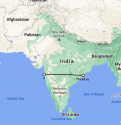Yes China control of Tibet is a strategic threat to Indian water supply, especially in the next few decades as global warming heats up.
The ultimate dream of India is to have an independent Tibet under Indian control.
This is another lie that the media tells about China in order to drum up the "China threat" narrative. China poses ZERO threat to India's water supply and here's why.
First, it's literally technologically impossible to "cut off" India's water supply by blocking off upstream water flow in tibet. This is because the Tibetan upstream actually contributes a minuscule amount of water to the Indo-Gangetic plains. All rivers gets most of their water from rain collected in the river's basins and tributaries, not from upstream. In the case for India, warm air from the Indian ocean is trapped by the Himalayan mountains, which then cools and precipitates into the Ganga-Satluj Ka Maidaan, forming major rivers like the Indus, Ganges, and Brahmaputra which then drains back into the ocean. To threaten India's great river systems would literally require magic that stops all rain fall in the region or cause water to climb against gravity up the mountain and drain into Tibetan plateau.
Second, even if such magic exists, China doesn't have any intention of cutting off water supply to any of its neighboring countries because it brings no benefits. Keeping the diplomatic fallout of such actions aside, China is already dealing with floods in the southern regions, why would China want to bring more water there lol.
Finally, what makes you think an independent Tibet is easily controlled by India? I would say it's likely for an independent Tibet to seek some form of strategic balance to India's powerful military and nuclear arsenal. Maybe they get their own nuclear weapons, and become friends with Pakistan or become more like India's North Korea. The area becoming destabilized is surely bad for India, while the major arms dealers profit.
Conclusion: think for yourself. Reject the media narrative.


